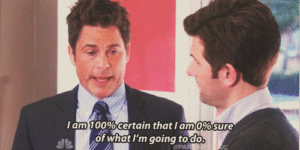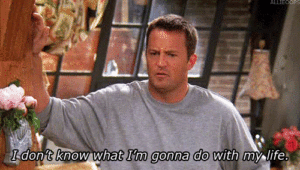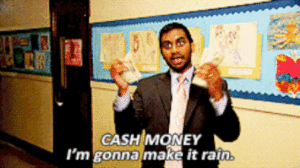I know that most people are looking forward to fall break, but I am in the midst of my third week here at Trinity and am just getting settled into my classes, or so I thought. Prior to coming to campus, I intended on taking two biochemistry courses, which were approved by the department head at Keck and by the SAGE office at Scripps. I was excited to have the opportunity to take science courses at a larger university and experience a different environment in lectures and in labs. What I found out after registering for the courses, was that the courses were designed specifically for international students and would not have any lab portion to them. 
At first, this was exciting news! I wouldn’t have to take any labs, in addition to my lectures, which would mean more free time during the week and less time in class. What I began to realize as I mulled this over, was that I might have a harder time getting these courses approved by Scripps, now that I had this new information.
For science courses, they generally need to align with another course at Keck in order for them to transfer and replace a specific course. I was hoping that my course entitled “Protein Structure” could take the place of “Biochemistry” at Keck, but would only cover about two thirds of the content at home, so would not be eligible for a direct replacement. The other course, entitled “Cell and Membrane Biology” was similar; there was not enough overlap between it and “Cell Biology” at Keck. Additionally, there is a lab portion required for the course at Keck, but not for international students at Trinity. In any event, I ended up having to drop these two courses, trading them in for two English courses, which I am very excited to be taking. The moral of this story is that often, study abroad programs are not tailored to science students, and there are very few places where the expectations for assessments and labs will match up with those at Keck or other universities in the United States. That was another factor in my decision to drop the courses. At Trinity, you take one final at the end of the semester, and that decides your entire grade. To me, that sounded very stressful, and quite frankly, I am glad that I don’t have to go through that experience.
As of now, my schedule is much more free, but I know that I will be very busy fulfilling my major requirements when I come back in the spring. Although it may be stressful to be taking more science courses at the same time, I think that it would’ve been more stressful to try to adapt to the system that they have over here, in regards to assessments.

Studying abroad has presented many challenges already – getting used to a new registration system, learning the ins and outs of navigating a larger campus, and learning to feel comfortable with 150 other people in a lecture hall – but I’m excited by the opportunities I have had so far and am interested to see how I feel about science after a semester off from it.

 What’s your major? If you’re a sophomore, or even a first year, not only are you likely to hear this questioned, but you also might not know how to answer it. Everyone has to choose a major at some point in their college career. At first, picking a major can be overwhelming because it feels like you are committing yourself to that subject for the rest of your college career. Many people start college intent on majoring in politics and end up changing to history or chemistry, where the major you started with and the one you ended with are often completely unrelated. What I have recently discovered is that even after you declare your major, you can still change it. It is a preconceived notion that once you declare, you cannot change your mind. What I am realizing more and more often, is that there are very few things you can get involved in that will not allow you to change your mind if you decide it’s not for you.
What’s your major? If you’re a sophomore, or even a first year, not only are you likely to hear this questioned, but you also might not know how to answer it. Everyone has to choose a major at some point in their college career. At first, picking a major can be overwhelming because it feels like you are committing yourself to that subject for the rest of your college career. Many people start college intent on majoring in politics and end up changing to history or chemistry, where the major you started with and the one you ended with are often completely unrelated. What I have recently discovered is that even after you declare your major, you can still change it. It is a preconceived notion that once you declare, you cannot change your mind. What I am realizing more and more often, is that there are very few things you can get involved in that will not allow you to change your mind if you decide it’s not for you. I came to Scripps intent on double majoring in biochemistry and English. After taking an extremely challenging course my first semester, entitled Introduction to Biological Chemistry, or IBC for short, I got a glimpse of what science would be like for the remainder of my time at Scripps, and what it would mean for me to, not only be a science major, but pursue another major on top of that. Recently, I have been questioning everything. Should I double major? Should I dual major? Should I just do a major and a minor? Hearing my advisor tell me that I could change my major, even after I declared, was such a relief. Even if it’s not ideal, it’s still possible, and that makes it feel a whole lot less binding. There seems to be a preconceived notion that you can’t change your major, which makes the whole process seem that much more intense and stressful.
I came to Scripps intent on double majoring in biochemistry and English. After taking an extremely challenging course my first semester, entitled Introduction to Biological Chemistry, or IBC for short, I got a glimpse of what science would be like for the remainder of my time at Scripps, and what it would mean for me to, not only be a science major, but pursue another major on top of that. Recently, I have been questioning everything. Should I double major? Should I dual major? Should I just do a major and a minor? Hearing my advisor tell me that I could change my major, even after I declared, was such a relief. Even if it’s not ideal, it’s still possible, and that makes it feel a whole lot less binding. There seems to be a preconceived notion that you can’t change your major, which makes the whole process seem that much more intense and stressful. The truth is, it’s okay to not know what you’ll major in, or what you want to do in the future. The beauty of going to a liberal arts college is that you have the opportunity to take classes in so many different disciplines, and at the other colleges, that you can figure out what you like and what you don’t like. In addition, there are so many events and opportunities for internships and other jobs that might open a door to something that you end up falling in love with. On the other hand, if you are set on one specific major or field of study, it is important to keep your options open and be willing to fall in love with something new.
The truth is, it’s okay to not know what you’ll major in, or what you want to do in the future. The beauty of going to a liberal arts college is that you have the opportunity to take classes in so many different disciplines, and at the other colleges, that you can figure out what you like and what you don’t like. In addition, there are so many events and opportunities for internships and other jobs that might open a door to something that you end up falling in love with. On the other hand, if you are set on one specific major or field of study, it is important to keep your options open and be willing to fall in love with something new.



